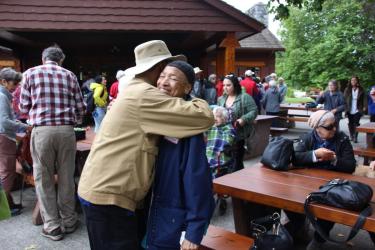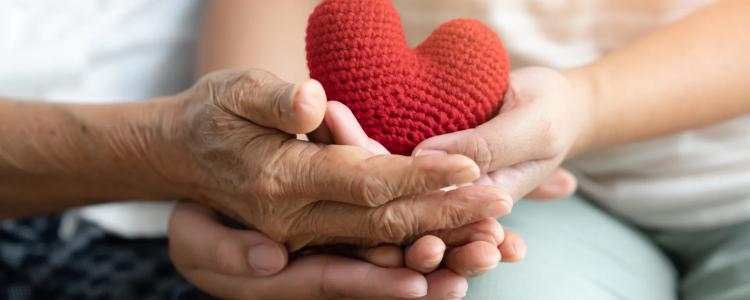By Katie Freeman, departing social work student at the UW Memory and Brain Wellness Center and the Memory Hub
We don’t often think about it as such, but social connection is as necessary to our survival as food, water, and shelter are. Humans are social animals, and we have always depended on one another to survive. This is as true today as it was thousands of years ago. As a result, our bodies and brains have evolved in such a way that we need these connections to other people to be at our best health. We are biologically wired for social engagement and our brains have adapted to expect proximity to other people.
__sm__sm.jpg)
A photo from the Seattle Zoo Walks. Courtest, Alzheimer's Association
Social connection has a big impact on our health. Research shows that people who are more socially connected live longer and have better physical, mental, and cognitive health outcomes. Social isolation, on the other hand, can lead to poorer health outcomes. A recent advisory report from the US Surgeon General highlighted this by comparing social isolation to smoking cigarettes. It turns out that chronic isolation can increase the risk of premature death as much as smoking up to 15 cigarettes a day does. Chronic isolation and loneliness can also increase the risk of dementia in older adults by 50%.
There are three main hypotheses for why social connection and engagement have such a big impact on our cognitive health:
The Stress Hypothesis
This hypothesis looks at the connection between chronic loneliness and stress, suggesting that stress can cause too much of a type of neurochemicals called glucocorticoid, which can accelerate the degeneration of the hippocampus. The hippocampus is part of our brain's limbic system and plays an important role in forming and maintaining memories. The degeneration is linked to an increased risk of dementia
The Vascular Hypothesis
The Vascular Hypothesis ties brain health to cardiovascular health. We know that social connection improves cardiovascular regulation, and this hypothesis suggests that cardiovascular regulation in turn reduces a person’s risk of neurodegenerative disease.

Pastor Patrinell Wright, Founder of Total Experience Gospel Choir gets a big thank you after her performance at the Dementia Without Borders event hosted by the UW Memory and Brain Wellness Center and the UBC Centre for Research on Personhood in Dementia.
The hypothesis with the most evidence and support is the Cognitive Reserve Hypothesis. Social connection increases cognitive reserve, which mitigates the impact of neuropathologies. Let’s break down what that means. Cognitive reserve is, in essence, our brain’s ability to deal with damage or pathology. This is something that we started identifying in the late 80s, when researchers were beginning to see in people diagnosed with Alzheimer’s that sometimes there were discrepancies between their neuropathology, or the physical damage done to the brain, and the clinical manifestations of the disease. Their brains may show significant signs of the brain damage associated with advanced Alzheimer’s, but the person never showed the cognitive and behavioral symptoms that you would typically associate with that level of neuropathology. So cognitive reserve is the brain’s resilience in the face of disease. And there are two different ways this can show up in the brain:
Neural Reserve
When our neural networks are more efficient, they have greater capacity and are more flexible, which allows them to cope with the disruption imposed by brain pathology. When the disease impacts our standard neural processing networks, the brain starts to use different structures and networks that people without these diseases typically don’t use, which is a process called neural compensation.
Numerous factors impact our brain's capacity for cognitive reserve, including education, socioeconomic status, and social connection. So social connection can improve this cognitive reserve and allow our brains to be more resilient in the face of disease.
This is so important because we can see that social connection is a protective factor for our cognitive health, but we also know that having dementia can disrupt our social connection. We may face stigma around our diagnoses, or misunderstanding. A person living with dementia may not want to share what’s going on with other people. Their friends might withdraw from out of fear of dementia. There’s an increased risk of depression with dementia, which can lead to social withdrawal. A family may live in communities that don’t offer dementia-friendly services and activities. And then there’s often cognitive challenges that impact a person’s ability to socialize.
This information can feel a bit bleak, but the truth is that there are a lot of ways that we can still build social connection. Seattle is a champion of the dementia-friendly community movement, with a wide network of organizations, professionals and community members working together to create opportunities for engagement and connection for those impacted by dementia. We can all contribute to this meaningful project.
Resources
Are you a person living with dementia? Check out momentiaseattle.org for a calendar of dementia-friendly social and recreational programs across the Puget Sound.
Are you a community member interested in building dementia-friendly communities? Sign up for a Dementia Friends session to learn more.
Sources:
Amano, T., Reynolds, A., Scher, C., & Jia, Y. (2021). The effect of receiving a diagnosis of alzheimer’s disease and related dementias on social relationships of older adults. Dementia and Geriatric Cognitive Disorders, 50(4), 401–406. https://doi.org/10.1159/000519581
Hackett, R. A., Steptoe, A., Cadar, D., & Fancourt, D. (2019). Social engagement before and after dementia diagnosis in the English Longitudinal Study of Ageing. PLOS ONE, 14(8). https://doi.org/10.1371/journal.pone.0220195
Penninkilampi, R., Casey, A.-N., Singh, M. F., & Brodaty, H. (2018). The association between social engagement, loneliness, and risk of dementia: A systematic review and meta-analysis. Journal of Alzheimer’s Disease, 66(4), 1619–1633. https://doi.org/10.3233/jad-180439
Stern, Y. (2009). Cognitive reserve. Neuropsychologia, 47(10), 2015–2028. https://doi.org/10.1016/j.neuropsychologia.2009.03.004
U.S. Public Health Service. (2023). Our Epidemic of Loneliness and Isolation: The U.S. Surgeon General’s Advisory on the Healing Effects of Social Connection and Community. https://www.hhs.gov/sites/default/files/surgeon-general-social-connection-advisory.pdf





